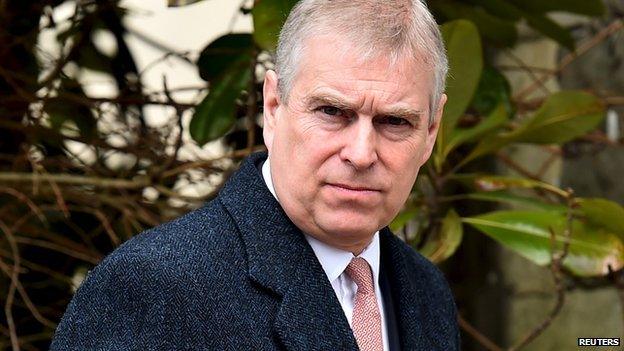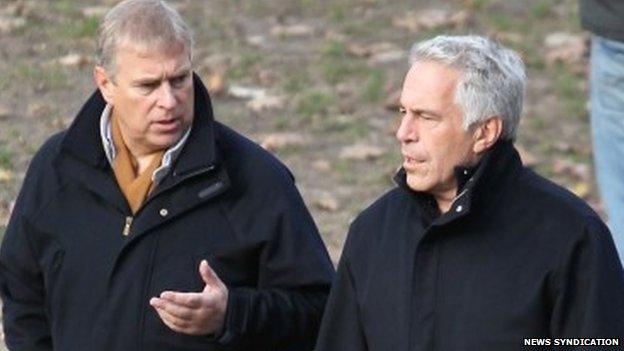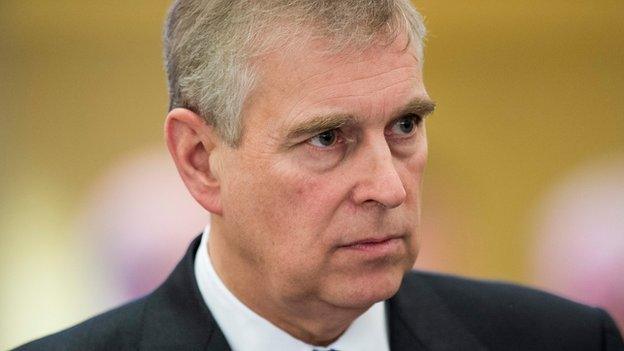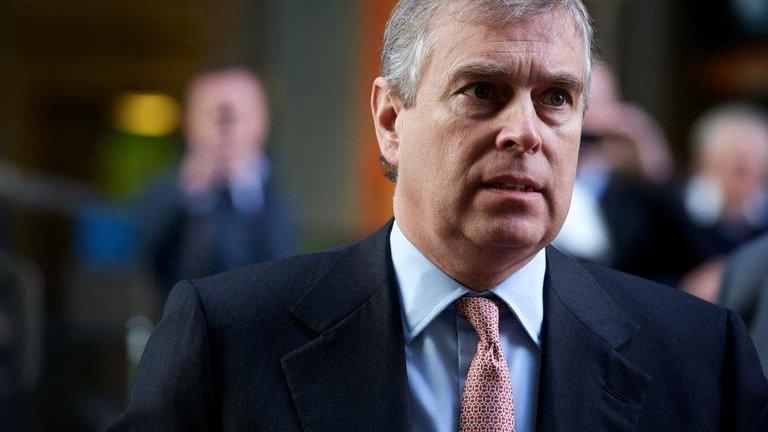US judge strikes out Prince Andrew sex claims
- Published

Claims that a woman was forced to have sex with Prince Andrew when she was 17 are to be struck from the record of a civil case in the US, a judge has said.
The Duke of York was named in court papers in Florida by a woman alleging financier Jeffrey Epstein forced her to have sex with the duke three times.
But Judge Kenneth Marra said the "lurid" claims were "unnecessary" to decide the civil case.
Buckingham Palace has previously "emphatically" denied the allegations.
BBC royal correspondent Nicholas Witchell said Judge Marra had expressed no opinion as to the "validity or veracity" of the allegations against Prince Andrew.
'Immaterial and impertinent'
The duke had been named in documents filed in a Florida court about how prosecutors handled a case against Epstein, a former friend of the royal.
The documents concerned claims by Virginia Roberts, who alleged that Epstein had forced her to have sex with powerful men - including the duke - when she was 17.
Two women - known as Jane Doe #1 and Jane Doe #2 - are suing the US government, saying it failed to protect their rights when it entered into a plea deal with Epstein, who spent time in jail in 2008-9 for a sex offence with a minor.

Prince Andrew is a former friend of financier Jeffrey Epstein
Ms Roberts - referred to as Jane Doe #3 in the court papers - had been attempting to join the claim against the US government.
But the US judge denied her attempt to join the claim and said her allegations about Prince Andrew were "unnecessary to the determination" of the case.
"The factual details regarding with whom and where the Jane Does engaged in sexual activities are immaterial and impertinent to this central claim," the judge said in a ruling.

Analysis
by Rajini Vaidyanathan, BBC North America correspondent
Lawyers for Virginia Roberts have told me this isn't the end of their fight.
They issued a short statement on behalf of their client which simply read: "I'm happy to participate in this important case."
But it's unclear how she will, now the judge has dismissed her request to join Jane Doe 1 and 2 in their fight against the US government (and the way it handled the Epstein case).
She could appear as a witness and, if that case is successful, she could benefit in the longer run as one of Epstein's alleged victims.
But for now, the judge's decision does appear to be the end of Prince Andrew's association with the case.
The documents containing the claims he'd had sexual relations with Virginia Roberts have been thrown out, although the judge didn't pass comment on the allegations themselves. The prince has always denied them.

Former Harvard law professor Alan Dershowitz - who was also accused of having sex with Ms Roberts in the court papers - told the BBC he felt completely vindicated by the judge's ruling to strike off the "salacious pleadings".
However, Ms Roberts' lawyers said they did not believe this was the end of the case for their client.
In the court papers, Ms Roberts said she had been forced to have sexual relations with the duke in three locations - in London, New York and on a private Caribbean island owned by Epstein - between 1999 and 2002.
Responding to the claims - which surfaced at the start of the year - Buckingham Palace said "any suggestion of impropriety with under-age minors is categorically untrue".
In a further statement, the palace said the claims against Prince Andrew were "categorically untrue" and lacked "any foundation".
Speaking at a world business forum in January, Prince Andrew said he wanted to "reiterate" the denials issued by Buckingham Palace.
- Published22 January 2015

- Published2 January 2015
